#Carry On Teacher (1959)
Explore tagged Tumblr posts
Text

#Carry On Sergeant (1958)#Carry On Nurse (1959)#Carry On Teacher (1959)#Carry On Constable (1960)#Carry On Regardless (1961)#Carry On Cruising (1962)#Carry On Cabby (1963)#Carry On Jack (1964)#Carry On Spying (1964)#Carry On Cleo (1964)#Carry On Cowboy (1965)#Carry On Screaming! (1966)#Don't Lose Your Head (1967)#Follow That Camel (1967)#Carry On Doctor (1967)#Carry On Up The Khyber (1968)#Carry On Camping (1969)#Carry On Again Doctor (1969)#Carry On Up The Jungle (1970)#Carry On Loving (1970)#Carry On Henry (1971)#Carry On At Your Convenience (1971)#Carry On Matron (1972)#Carry On Abroad (1972)#Carry On Girls (1973)#Carry On Dick (1974)#Carry On Behind (1975)#Carry On England (1976)#That's Carry On! (1977)#Carry On Emmannuelle (1978)
0 notes
Text
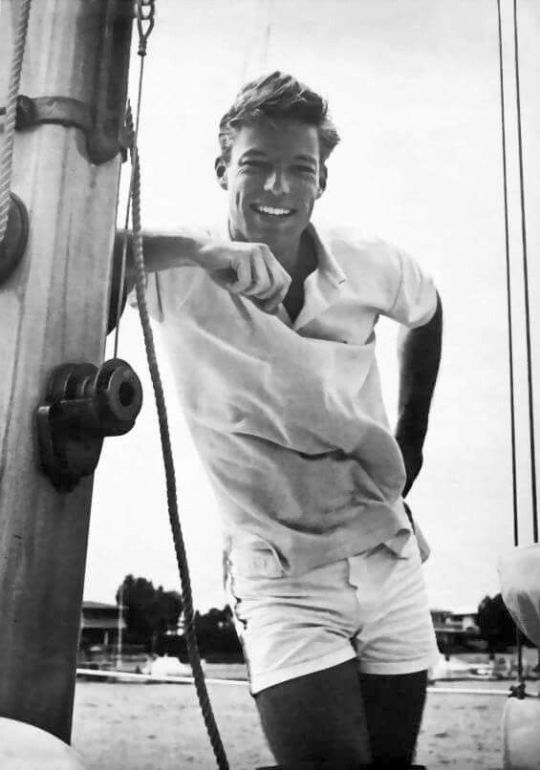
Richard Chamberlain
Dashing American actor best known for his many roles in hit TV series including Dr Kildare, The Thorn Birds and Shogun
Despite becoming a lauded stage and film actor, Richard Chamberlain, who has died aged 90, carried the label of soap-opera star around his neck for most of his career of more than five decades.
It began with his huge success in the hospital television series Dr Kildare (1961-66), in which Chamberlain’s clean-cut good looks were the prime attraction, bringing him thousands of fan letters a week. Chamberlain’s other immensely successful television roles came in three mini-series, Centennial (1978-79), Shogun (1980) and The Thorn Birds (1983).
His perfectly chiselled features, which made him ideal for romantic leads in soap operas, prevented many producers from visualising him in more demanding roles. However, through talent and determination he starred in numerous films and on the stage in parallel to his television work.
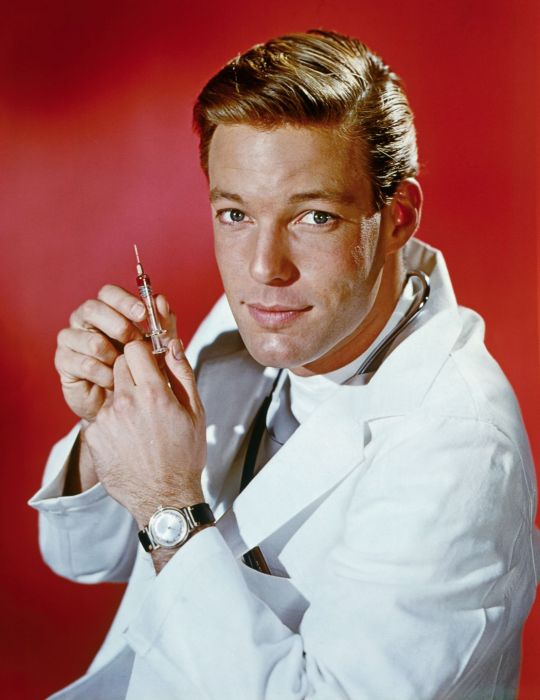
Born in Los Angeles, he had a cool relationship with his alcoholic father, Charles, a salesman, but a warm one with his mother, Elsa (nee Von Benzon). At Beverly Hills high school, he excelled in athletics, and his good grades enabled him to study art history and painting at Pomona College, southern California, where he was able to satisfy his dream of becoming an actor in plays by Shakespeare, Shaw and Arthur Miller. After graduating, Chamberlain served 16 months in Korea, where he was made company clerk of his infantry company, later promoted to the rank of sergeant.
On his return to the US, Chamberlain studied acting with Jeff Corey, who became renowned as a teacher after being blacklisted in Hollywood by the House Un-American Activities Committee.
Although Corey’s sense-memory Stanislavskian method is not immediately apparent in Chamberlain’s performances, the actor claimed to have learned how to tap into his own emotions and psyche. At the time, he was struggling with having to “live a lie” about his sexuality.
In 1959, Chamberlain, Leonard Nimoy and Vic Morrow were among the founders of the Company of Angels, a repertory theatre in Los Angeles. While playing there in La Ronde and The Caine Mutiny Court-Martial, Chamberlain started to get parts in television series. His first feature films were The Secret of the Purple Reef (1960), a low-voltage, low-budget thriller shot in Puerto Rico, and A Thunder of Drums (1961), a western in which he was hardly noticeable as a young cavalry officer.
Then came the role of Dr Kildare, for which Chamberlain beat 35 other candidates. In the first episode, the senior medic Dr Leonard Gillespie (Raymond Massey) tells Chamberlain, as the young, earnest, caring James Kildare, an intern at Blair general hospital: “Our job is to keep people alive, not to tell them how to live.” Kildare ignores the advice, thus supplying the basis for most of the plots of the next 190 episodes across five seasons.
In 1962, with his popularity at its height, he recorded a hit song, Three Stars Will Shine Tonight, based on the music of the show’s hummable opening theme. It revealed that Chamberlain had a fine singing voice, which he used on a number of singles and an album, Richard Chamberlain Sings (1962), and much later as leads in stage musicals such as My Fair Lady (1993), The Sound of Music (1998), Scrooge (2004), The King and I (2006) and Monty Python’s Spamalot (2009).
When Dr Kildare ended, Chamberlain decided to prove that he was not just a pretty face, by appearing in summer stock productions of The Philadelphia Story and Private Lives (both 1966).
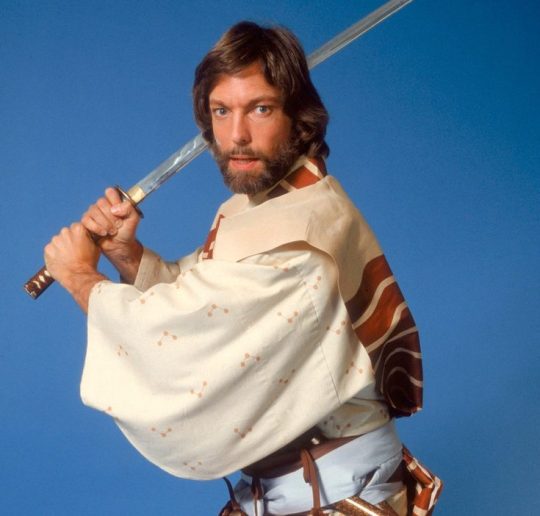
He then worked for three years in Britain, on television, stage and film. He was excellent as Ralph Touchett in the BBC’s six-part adaptation of Henry James’s novel The Portrait of a Lady (1968).The role got him noticed by Peter Dews, the artistic director of Birmingham repertory theatre, who offered him the chance to play Hamlet in 1969.
The play was a sell-out for its limited five and a half week run, and in the main, the British critics were positive, with the Times reflecting the consensus: “Anyone who comes to this production prepared to scoff at the sight of a popular television actor, Richard Chamberlain, playing Hamlet, will be in for a deep disappointment.” The Daily Mail commented that “the perturbed spirit of Dr Kildare may rest at last. In Mr Chamberlain we have no mean actor.”
In films, he was a noble Octavius Caesar in Julius Caesar (1970), and a striking Lord Byron in Lady Caroline Lamb (1973), and he was able to express some of his own angst and sexual liberation as a gay Tchaikovsky in Ken Russell’s The Music Lovers (1971). At this time, it was an open showbiz secret that Chamberlain was romantically involved with the US actor Wesley Eure.
The rest of the films he made in the 1970s – The Three Musketeers (1973) and The Four Musketeers (1974), in which he played Aramis; The Slipper and the Rose (1976), almost typecast as Prince Charming; and the disaster movies The Towering Inferno (1974) and The Swarm (1978) – were lucrative but hardly challenging. He was more stretched in Peter Weir’s The Last Wave (1977), shot in Australia, where he was the initially smug lawyer defending a group of Indigenous Australians accused of murder.
In the meantime, Chamberlain had made a triumphant Broadway debut in Tennessee Williams’s The Night of the Iguana (1976-77) at Circle in the Square theatre. According to one critic, Chamberlain, as the defrocked priest now a tour guide, “captures the self-lacerating torment of Reverend Shannon”. During the run, he started a relationship with Martin Rabbett, a production assistant on the play. They remained together until 2010, and later resumed their partnership.
In the 80s, Chamberlain established himself again on television, earning the nickname “king of the miniseries”. Shogun, based on James Clavell’s novel, starred Chamberlain as Pilot-Major John Blackthorne, an Englishman trying to gain acceptance in early 17th-century Japan. Chamberlain, long-haired and black-bearded, held his own among a cast of superb Japanese actors that included the dynamic Toshiro Mifune.
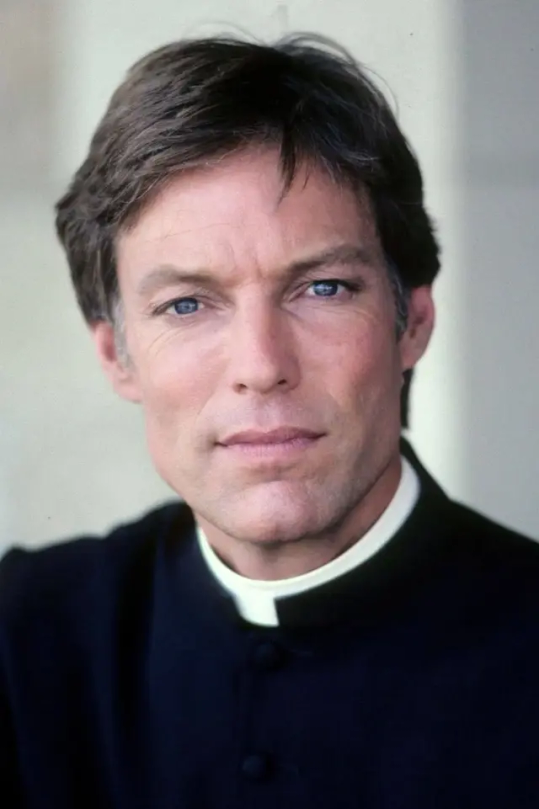
In The Thorn Birds, he was sexy Father Ralph de Bricassart, the Roman Catholic priest who carries on a tortured, illicit romance with Meggie Cleary, played by Rachel Ward, in the Australian outback. It was disliked by Colleen McCullough, the author of the original 1977 bestseller. She said: “It was instant vomit! Ward couldn’t act her way out of a paper bag and Chamberlain wandered about all wet and wide-eyed.” Nevertheless, the 10-hour, four-part, $23m show became one of the most watched TV series ever.
Chamberlain continued to move between films, television and theatre, and his homes in Hawaii and Los Angeles, over the next decades. He was a guest star on the TV comedy series Will & Grace (2005), and his final film role came as an acting coach in Finding Julia (2019).
In 2003, in his memoir, Shattered Love, he wrote about his dislike of himself for not being true to himself in order to protect his matinee idol image, but in coming out he “finally made friends with life”.
He is survived by Rabbett.
🔔 George Richard Chamberlain, actor, born 31 March 1934; died 29 March 2025
Daily inspiration. Discover more photos at Just for Books…?
19 notes
·
View notes
Text



























Robert Goddard Day
Robert Goddard Day is celebrated on March 16 every year. It is a day to celebrate the great mind of Dr. Robert Hutchings Goddard and his achievements. He is known as the father of American rocketry and the space age. Dr. Goddard discovered the technology and created the first liquid-fueled rocket in 1926. The success of his test is considered a milestone in the space age. His achievement is of the same importance as the invention of the Wright brothers in testing the first flight. He conducted the test from Auburn, Massachusetts, earning him the title “the father of modern rocket propulsion.”
History of Robert Goddard Day
Flight is a dream for every human being. Birds have always made us jealous with their ability to soar through the freedom of the vast white expanse of the sky, watching the flightless beings on the ground. On December 17, 1903, the Wright brothers took to the sky, giving wings to the dreams of humans to touch the sky. What felt like an impossible event a few decades ago is now easy to achieve. With the sky conquered, the next dream is to reach the infinite distances of space. The problem with the airplane is that it depends on the air and air pressure. Space does not have air, and, thus flight is not possible.
Dr. Robert Hutchings Goddard was born on October 5, 1882, in Worcester, Massachusetts. He had a way to work in a vacuum. He predicted that a rocket would be able to work in the emptiness of space as it does not need air to push. He was a physics teacher at Clark University in Worcester. He had already started working on his idea of space travel in 1915. When Goddard claimed that the rockets could be used to transport payloads to the moon, he was ridiculed, and his theory was considered folly. But time taught them they were wrong.
Goddard did not live long enough to see his childhood dream of space travel realized. But his work laid the foundation for propelling modern space dreams.
Robert Goddard Day timeline
1909
The Gunpowder Rockets
As a student at Worcester Polytechnic Institute in Massachusetts, Goddard experiments on a gunpowder-powered rocket.
1923
The Director of Physical Laboratory
Goddard is appointed the director of the Physical Laboratory.
1926
The First Rocket Test
Goddard tests the first liquid-fueled rocket.
1959
The Goddard Space Flight Center
Nasa establishes Goddard Space Flight Center in Maryland.
Robert Goddard Day FAQs
Why was the liquid-fueled rocket important?
Liquid rockets can provide more thrust and allow engineers to specify the range of the rocket.
Why is it important to have rockets?
They help deliver satellites to space and enable global communication, weather forecasts, and other technologies like GPS, which are an integral part of our lives.
How did rockets change the world?
Rockets changed warfare. Due to intercontinental ballistic missiles and nuclear warheads, wars are no longer possible between major powers due to mutually assured destruction. Rockets also opened a frontier for space exploration. It helped revolutionize the technologies that we are so dependent on.
How to Observe Robert Goddard Day
Carry out a science experiment: This day is best spent doing a science experiment. You can start small with an experiment like collecting gas from a soda bottle. Record the experiment and post it on social media.
Watch a scientific documentary: Another easy way to spend the day is by watching scientific documentaries. Fluidity, air pressure, gravity, space, chemistry, etc. You choose the topic and start watching.
Create a mini rocket: You can purchase small rockets that can be assembled and taken off. Don’t worry, if they are not as advanced as the original rockets. We do not have to be rocket scientists to work on them.
5 Interesting Facts About Rockets
Arrows and rockets: The first rockets were used to propel arrows with greater speed and impact.
The first rockets: The Song dynasty of China found ways to weaponize gunpowder-powered rockets during the tenth century.
The ‘Father of Rockets’: It took Goddard 17 years to develop the first liquid-fueled rockets.
The iron-cased rockets: Tipu Sultan of India used iron-cased rockets for military use.
The first space rocket: In 1957, Russia created Sputnik, the first rocket that reached space.
Why Robert Goddard Day is Important
Space is infinite: Space is infinite. The contributions of Dr. Goddard helped us reach the infinity of space.
Sky is no longer the limit: Something beyond the sky just opened up thanks to the rockets. Now we can dream even bigger into the vast dark space.
It promotes innovations: Innovations can change society. With the advancement in technology, advancement in human civilization follows. The rocket's innovation now allows us to launch satellites and progress into the modern world.
Source
#Launch Complex 39B (LC-39)#Goddard Day#Dr. Robert Hutchings Goddard#first liquid-fuel rocket#16 March 1926#anniversary#US history#travel#USA#Kennedy Space Center Visitor Complex#Florida#summer 2010#2009#vacation#original photography#engineering#Launch Complex 39A (LC-39)#Saturn V#Rocket Garden#tourist attraction#landmark#NASA#National Aeronautics and Space Administration#Robert Goddard Day#RobertGoddardDay
11 notes
·
View notes
Note
top 5 strangely formative films you saw as a child?
ooh this is a toughie but I'll do my best
Beauty and the Beast (1991)
Gun to my head this is probably my favorite film of all time. I choose to blame it for my interest in (fictional) broody dudes.
2. One Hundred and One Dalmatians (1961)
I watched this movie every single day for a year and a half when I was in preschool. I barely remember it but I'm sure it's responsible for a lot of the wiring in my brain. I do remember that I carried around a plushie of Lucky the dog everywhere I went until my kindergarten teacher forced me to stop.
3. Sleeping Beauty (1959)
I'm sure you're starting to see a pattern at this point. As a small, grumpy person, I identified strongly with Merryweather, the feistiest of the three good fairies. As an adult, I appreciate how radical this movie really is: a tentpole fantasy film that's not only led by its women characters, but by three fluffy grandma types. It's hard to imagine a major studio putting out a movie like that today. In fact, when Disney revised the telling for Maleficent (2014), they made the three good fairies stupid and incompetent in order to give more development to their cool sexy dark heroine. This actually makes the story less feminist than the 1959 version. "Sorry ladies," says Maleficent, "you're only worth taking seriously if you age like Angelina Jolie."
4. The Little Mermaid (1989)
Before Beauty and the Beast came out, I was obsessed with this movie. Then I had a vivid nightmare where Ursula the Sea Witch tried to keep me from my mother and refused to watch it again. Now I'm an adult and I love Ursula! She has one of the best villain songs ever.
5. An American Tail (1986)
The only not-Disney movie on this list, this film also sticks out for its more subtle characterization and take on the real-life struggles of 19th-century American immigrants and the urban poor. I think this movie was a catalyst for my own interest in history.
Thank you laconicmoon!
11 notes
·
View notes
Text
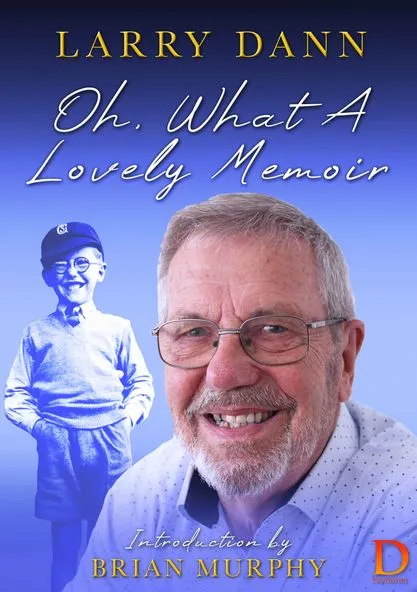
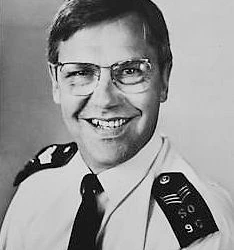
British actor Larry Dann became a household name in the 1980s through his wholly believable performance as the likeable and dependable sergeant, Alec Peters, in 229 episodes of ITV's long-running police drama, The Bill (2500 episodes 1983-2010). His autobiography has just been published by specialists in British television tie-ins, Oliver Crocker's Devonfire Books.
In the days before internet and social media, it was too easy to assume that mature actors in high profile roles appeared out of nowhere, fully formed, but of course that wasn't the case at all. Actors of Larry Dann's generation learned their craft over many years, through determination, no shortage of courage, and sheer, unrelenting hard graft. Born in 1941, he worked as a child actor in movies, which included a brush with Spencer Tracy, Deborah Kerr and George Cukor, and studied at the Corona Academy stage school from where he built an enduring career on stage and screen.
One of many highlights in Larry Dann's memoir is the fascinating window he affords us into the iconic Theatre Workshop, run by Joan Littlewood, and the production of their huge international hit, Oh What a Lovely War which, according to Michael Billington in The Guardian, not only changed attitudes toward the Great War, it also 'remade British theatre'.
"…So what effect did Oh What a Lovely War have? It helped change attitudes to the first world war. Although we may have read the poetry of Sassoon and Wilfred Owen, we had never before seen popular entertainment express the disenchantment felt at the time by the average soldier. Looking back at the 1963 programme, it is also clear that the production was intended as a political provocation…On a purely theatrical level, the show also did a lot to loosen up the formal rigidity of the British theatre. It was active in demolishing the gap between stage and auditorium, promoted the growth of the musical documentary and encouraged actors to take responsibility for research and development…"
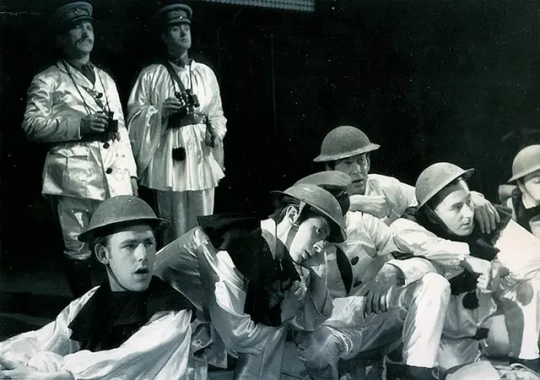
In Joan Littlewood's Oh What a Lovely War, which also featured his friend Brian Murphy, who later starred as George Roper in George and Mildred, and who wrote the foreword to Oh, What a Lovely Memoir
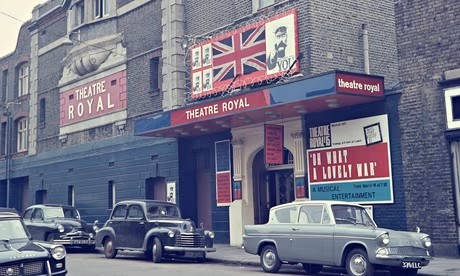
Larry Dann's diverse film career included some major Hollywood productions and a joyous experience working with David Niven, who we learn was just as charming, generous and friendly as his image portrayed, and neatly bookended the Carry On franchise, appearing in one of the earliest offerings, Teacher (1959), and in the final three of the original run; Behind (1976), England (1977), and the widely maligned, notorious Emmannuelle (1978).
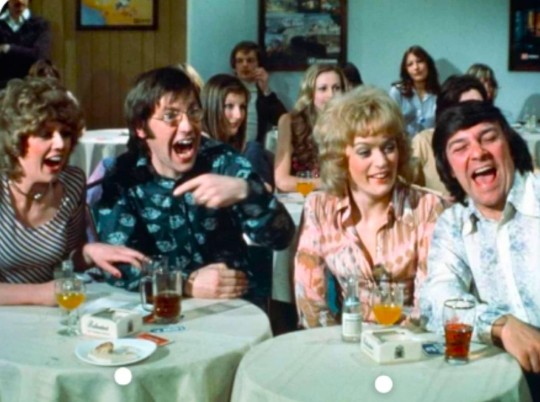
With Carol Hawkins, Sherrie Hewson and Brian Osborne in Carry On Behind
He also carved out a lucrative sideline in television commercials, working with some of the pioneering directors in that field, including Alan Parker, and Ridley and Tony Scott.
Larry Dann writes with pragmatic honesty about family troubles growing up, and the rollercoaster working life of an actor even with major roles in their CV. Oh, What a Lovely Memoir is a recommended read with some wonderful insights into the evolution of entertainment in post-war Britain.
Larry Dann was one of the first stars of The Bill to be interviewed by Oliver Crocker for The Bill Podcast.
#social history#british culture#british actors#biography#british television#book review#thames television#british theatre#joan littlewood#oh what a lovely war#stratford east#SoundCloud
9 notes
·
View notes
Text
did you know the first black person in space was an african-cuban man named arnaldo tamayo méndez ? a little post on him and his achievements for black history month since space exploration is my special interest and i think he should be more known !

Arnaldo Tamayo Méndez was born on the 29th of January 1942 in Guantánamo, into a humble Afro-Cuban family. He began to work from a very young age, becoming the only breadwinner for his family at the age of 13, while studying at the same time. He worked as a shoeshiner, a carpenter's assistant and a newspaper seller. Arnaldo Tamayo said :"Since childhood, I dreamed of flying, of being a military pilot."
During the dictatorship of General Fulgencio Batista, Arnaldo Tamayo Méndez participated in several student demonstrations in protest against the dictator who had turned Cuba into a United-States dominated country and whose economy and political sectors were plagued by the mafia. Cuba's economic sectors were largely in the hands of American multinationals. To ensure control of Cuba, the United States supported a corrupt ruling class linked to the mafia.
Tobacco and sugar, the main sources of income, were in the hands of monopolists, mainly American. Cuban workers were starving and did not have a single piece of land to cultivate. They had borrow money from loan sharks. There were no schools or teachers for the majority of Cuba's 6 million people.

After the start of the Cuban Revolution, in 1953, Arnaldo Tamayo entered in January 1959 the "Rebel Army" Technical Institute and after that the Cuban Revolutionary Armed Forces (Fuerzas Armadas Revolucionarias, F.A.R., in spanish)
He became a fighter pilot and trained to become a MiG-15 fighter pilot in the Soviet Union at just 19 years old. MiG-15 were produced in the U.S.S.R. and several communist block countries used them during conflicts but also for training.
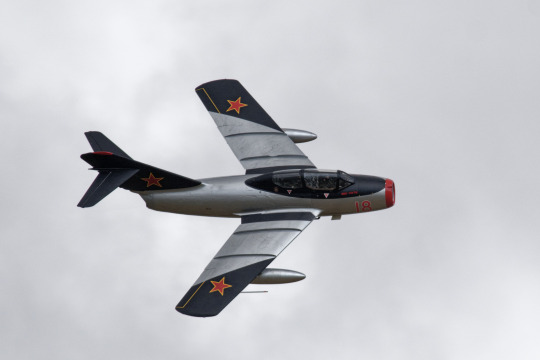
In April 1961, two events happened a few days apart :
On the 12th April, Yuri Gagarin became the first human to fly in space
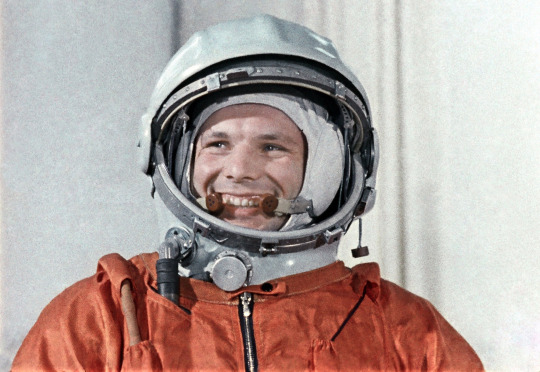
Between the 17th and 19th, C.I.A. and U.S.-backed Cuban exiles attempted a military invasion of Cuba which was successfully stopped by the Cuban army.

Arnaldo Tamayo took part in the combats against the C.I.A. mercenaries who had invaded Cuba. But a week before that victory, the news of Gagarin's successful flight into the cosmos greatly inspired him. So he was happy when he was later sent in the USSR to study in the Military Aviation School.
On the 24th July 1961, Yuri Gagarin, the first man in space, arrived in La Havana for a visit after his flight. In part of his speech, Yuri Gagarin said a sentence that stuck with Arnaldo Tamayo : "The day will come when a son of the Cuban people will also travel to the cosmos."
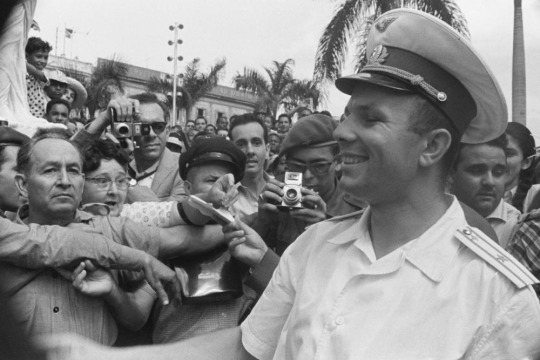


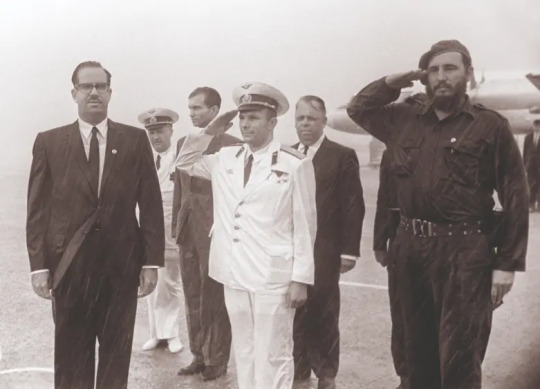
After his training in the Soviet Union (April 1961-May 1962), he came back to Cuba. In October 1962, during the Cuban missiles crisis, Tamayo carried out several reconnaissance missions (around 20) in the Cuban sky with the aim to intercept enemy aircraft. As the two powers come to an agreement, the Americans promise Moscow that they will not attack Cuba. So it is now possible for Arnaldo Tamayo to continue his studies. He applies to the Antonio Maceo Grajales Higher School of the Revolutionary Armed Forces, from which he successfully graduates in 1971. During his service in the Cuban Air Force, Arnaldo Tamayo makes countless flights and achieved the rank of first class pilot (Class I) and later become an instructor pilot. In 1975, he was chief of staff of the Santa Clara Aviation Brigade and is promoted in 1976 to lieutenant colonel.
Meanwhile, in 1966, the Intercosmos program (Интеркосмос) was created. It was a Soviet space cooperation program, carried out under the auspices of the USSR Academy of Sciences, among the countries of the socialist bloc, aimed at promoting international cooperation in space for peaceful purposes. The countries participating in this program had all adopted a socialist regime but some pro-Soviet non-aligned countries were included over the years. The program resulted in the development of 26 scientific satellites and the participation in space missions of around fifteen nationals of the co-opted countries.
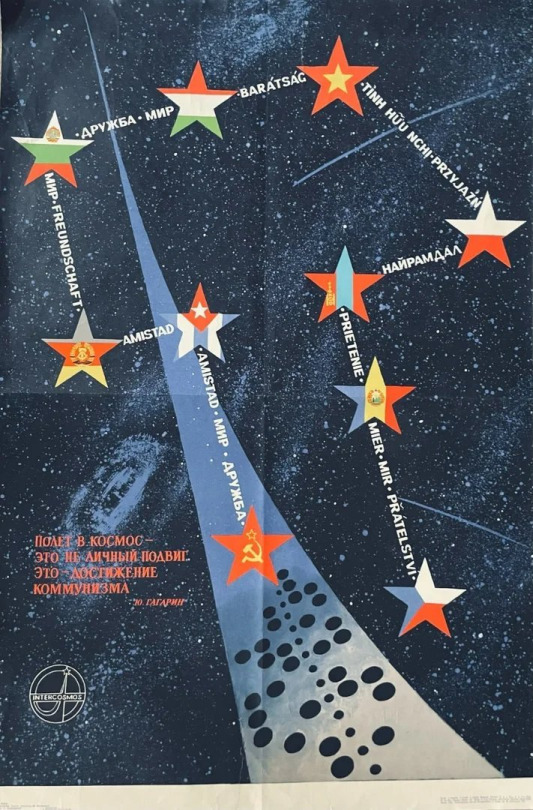

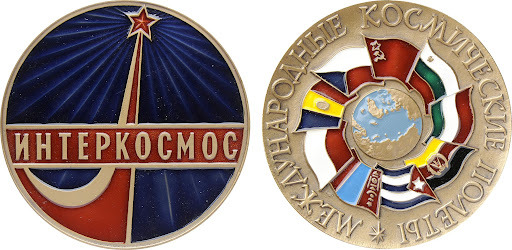
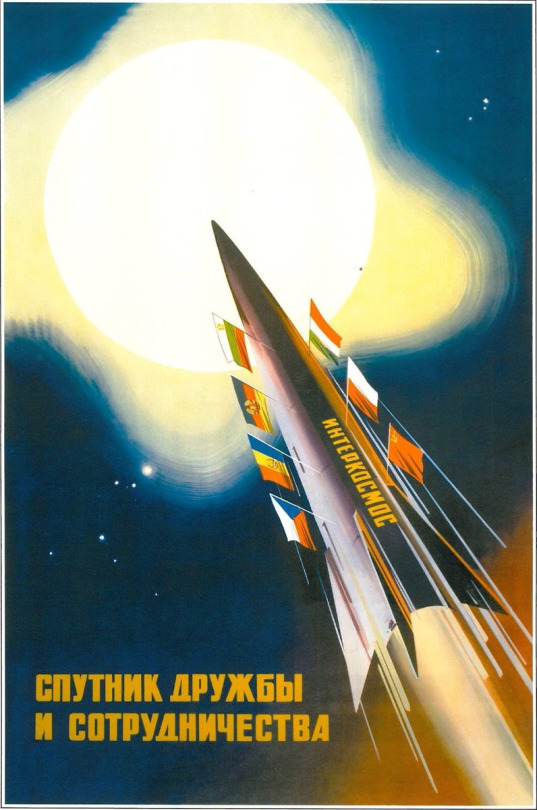
In the 1970s, the Intercosmos program starts training cosmonauts to send them in space, first in 1978 with the Czechoslovak Vladimír Remek, the first neither Soviet nor American cosmonaut. Cuba then sends Arnaldo Tamayo and his colleague José Armando López Falcón to the USSR to prepare for a space flight.


The applicants had to be experienced pilots with an accident-free record and speak Russian. 600 pilots registered but the number decreased in the as the weeks went by during the tests. Tamayo Méndez and López Falcón traveled to the City of Stars, near Moscow, to train as cosmonauts.
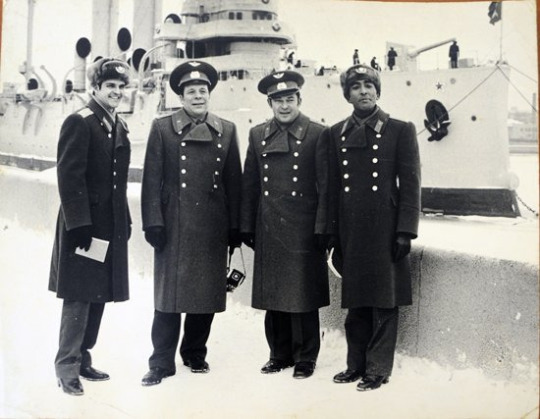


They were paired with Yuri Romanenko (Ю́рий Романе́нко) and Yevgeny Khrunov (Евге́ний Хруно́в) who both went to space once before that. Tamayo and Romanenko were chosen as the main crew while López and Khrunov were their backup crew. They started training in September 1979.
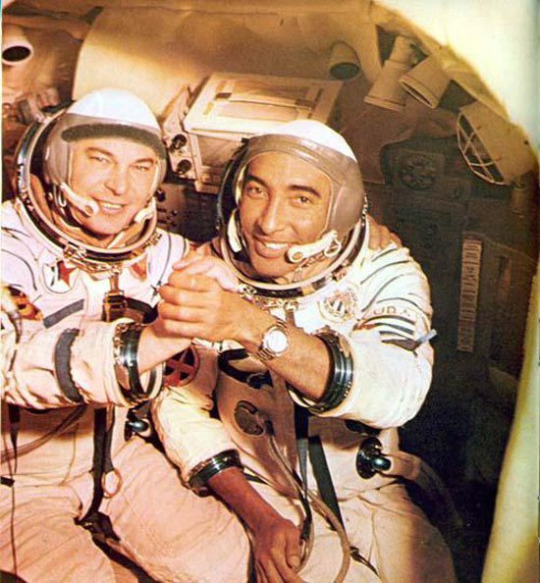


Yuri Romanenko saw Arnaldo Tamayo Méndez as jovial and has said of him : "In Tamayo, the best traits of Cubans are concentrated : the ability to work and perseverance. Plus cordiality, kindness and good humor. And believe me, they are qualities very important for cosmonauts." Arnaldo Tamayo described Yuri Romanenko as part of his family.
After a year, in September 1980, they were ready for their space flight : the "Soyuz 38" mission during which they would stay in Salyut 6, the soviet orbital space station, for several days, to carry out experiments. Finally, on the 18th September 1980, at 22:11 in Moscow and 15:11 in Cuba, Arnaldo Tamayo Méndez and Yuri Romanenko took off from the Baikonur cosmodrome (Kazakh SSR). Tamayo was traveling as a research cosmonaut while Romanenko was the commander of the spacecraft.
They were met at the Station by Leonid Popov (Леони́д Попо́в) and Valery Ryumin (Вале́рий Рю́мин), on board from April to October 1980, in light blue on the first picture. Romanenko and Tamayo's stay lasted 7 days and 20 hours, a week they used for their scientific researches.
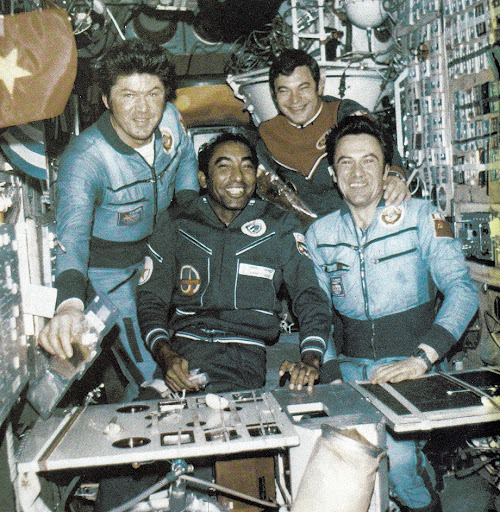
They studied different brain areas to further understand its electrical activity Another experiment was observing changes of skeletal muscle structure, as well as another on blood circulation, which sought to determine the impact weightlessness has on the human circulatory system. The other researches studied how cell division, immune system, concentrations of antibodies and other proteins and minerals were affected after prolonged exposure to a weightless environment. They also studied the growth of a crystal of sucrose in weightlessness.

They used calibrators developed by the Cuban National Institute of Sports, Physical Education and Entertainment. When the researches were completed, Soyuz 38 separated from Salyut-6 on the 25th October. The next day at 15:54, the rescue team welcomed the cosmonauts in Kazakhstan.
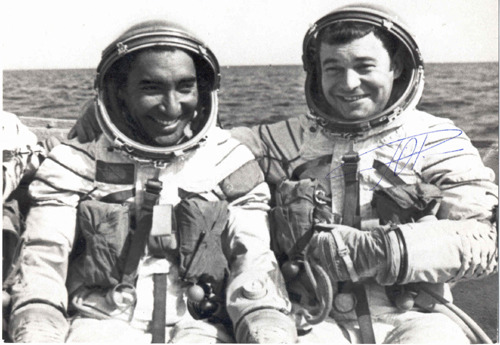
Arnaldo Tamayo Méndez, by being the first Latin American, first Afro-descendant and first Spanish speaker in space made history. Fidel Castro said that he "represented Cuba, Latin America, Africa and the Third World in the cosmos". Tamayo, with Romanenko was decorated by Raúl Castro with the first honorary medal of Hero of the Republic of Cuba and the Playa Girón Order. In Moscow, he received the Order of Lenin and was named Hero of the Soviet Union. His colleague had been awarded with these titles as well.
After the space flight, knowing of the sad death of Yuri Gagarin in a plane crash in 1968, Fidel prohibited the Cuban cosmonaut from flying or carrying out training flights in combat aircraft. Despite his love for flying and longing for the cosmos, Tamayo followed the orders.
Arnaldo Tamayo Méndez is now more known as a public and military leader than as a cosmonaut or a pilot. He became a general, a deputy of the National Assembly of People's Power of the republic and heads the foreign relations directorate of the Revolutionary Armed Forces of Cuba. He is still close with his colleagues, Soviet and others, especially his partner, the one he considers his "star brother" Yuri Romanenko, despite the distance and even after the fall of the U.S.S.R.. Today, Arnaldo Tamayo Méndez also heads the Cuba-Russia Friendship Association.
Arnaldo Tamayo Méndez expressed it this way: "My luck is similar to that of all the hungry people of my generation, for whom the revolution opened the paths of life. But there is a particularity, I was very lucky, they sent me to study in the Union Soviet, to a military pilot academy, and then... to the City of Stars, where cosmonauts live and study ."
Arnaldo Tamayo Méndez emphasizes that the relations between Cuba and the U.S.S.R. have deep important historical roots. The work of thousands of Soviet specialists allowed the small revolutionary island to greatly raise the level of its scientific and technical development. The participation of their engineers and agricultural specialists was a considerable contribution to the industrial development of Cuba. Thousands of Cuban students graduated from higher education centers in the USSR, receiving high-quality professional preparation, like Arnaldo Tamayo did.
Arnaldo Tamayo said that Yuri Gagarin, as a spiritual teacher, had a huge influence on him. "He was and will continue to be my idol. In the difficult moments of life, those that happen to everyone, I remember Gagarin's smile known throughout the world. And the discomfort recedes" Even if there hasn't been any other Cuban or Latin-American cosmonaut, Tamayo Méndez inspired plenty of people with his incredible trajectory of life, like Yuri Gagarin did in his time.

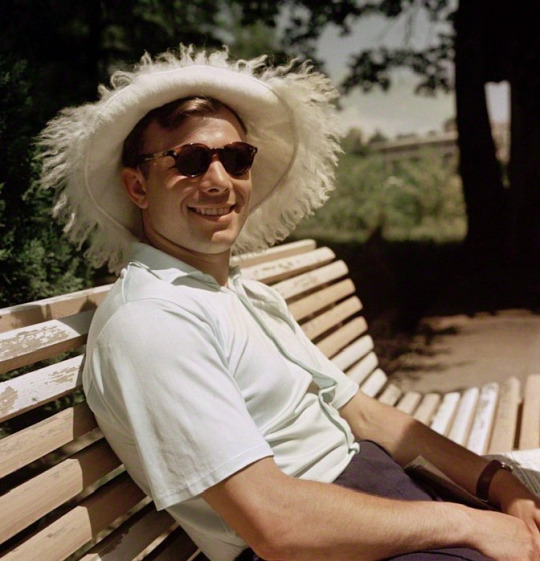
Look at their beautiful smiles !!
After him, several Black astronauts went to space, such as Guion Bluford (in 1983) or Mae Jemison (1992), leading the way for many more.
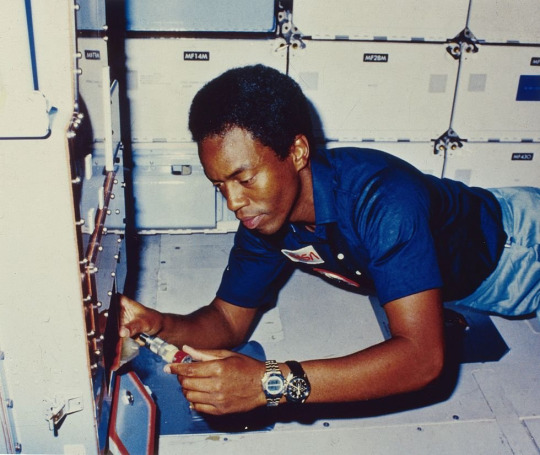
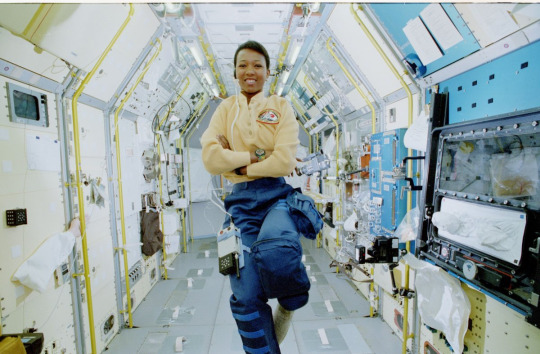
The 97th cosmonaut, Arnaldo Tamayo Méndez, has his name written in the History of World Cosmonautics as the first Cuban, first Latin American and the first Afro-descendant person who saw our planet from the Cosmos, representing his homeland and People with glory and honor.


2 notes
·
View notes
Text
The Brain That Wouldn't Die

She sits in a chemical bath on a laboratory table watching, watching…watching…watching a once prominent surgeon abase himself in hopes of gaining a new arm to replace the one he lost…watching a beautiful woman with one slight facial scar strapped to an operating table to be replaced by someone deemed more worthy…watching the results of her psychic rapport with the failed medical experiment in a closet nearby…and, most important, watching her fiancé, the only true monster in the room, as he plays God with other people’s bodies. She’s the infamous “Jan in the Pan,” the star of THE BRAIN THAT WOULDN’T DIE (1962, TCM, Tubi, Plex, Prime, YouTube), which could have given PLAN NINE FROM OUTER SPACE a run for its money as the worst film of 1959 if it hadn’t been held back from release until 1962, when it easily topped such stinkers as EEGAH!, THE SLIME PEOPLE and WALK ON THE WILD SIDE.
Hotshot young surgeon Jason Evers (billed as “Herb”) brings a man back from the dead during an operation. The truly miraculous part of this is that he stimulates the man’s brain without the skull’s getting in the way while his father massages the heart without needing a rib spreader to get to it. Perhaps the man died from not having a skeleton. On a drive with his fiancé, Jan not yet in the Pan (Virginia Leith), he crashes his car, leaving her body on fire but managing to save her head, which he does by reaching into the wreckage and just pulling real hard. He’s been experimenting with transplants, so he keeps her head alive while he goes off searching for a new, improved body for her. He never says he’s trying to give her a better body, but the fact he starts stalking strip shows and beauty pageants makes his intentions pretty clear. Meanwhile, Jan wakes up in that damned pan and discovers that the transplant serum developed by her ex- (I mean, would you marry a man who left you stewing in a chemical bath) has given her a psychic rapport with the creature assembled from various body parts and now in the closet. That’s a literal closet, as once he’s out he carries off the woman selected to supply Jan’s new body rather than run away with the not completely unattractive surgeon.

Big surprise, Leith actually gives a decent performance (when she’s not being dubbed by another actress because she hated the film so much, she refused to record any lines in post-production). She gets a lot of variety into her readings, even after she’s driven mad, and lets other people do the over-acting. I’ll bet that if you were in a car accident and wound up a severed head and discovered the love or your life was a mad scientist determined to give you the body they think they deserve, you’d act the same way. Don’t try to deny it. You know you would.
But most of the other actors are almost unspeakably bad. Adele LaMont, as the scarred beauty chosen to provide Leith’s new body, plays nothing but attitudes. You could use her to frighten recalcitrant acting students. And at that, she’s better than the two monotone strippers who end up fighting over Evers when they think he’s looking to trick with one of them. They end up in a rolling around on the floor, with one’s bosoms about to pop out of her corset just as the camera pans to a painting of two cats and the soundtrack brings forth a “meow,” in case you didn’t realize what was going on. Poor Evers, who was a serviceable enough TV actor, doesn’t do much more than glower, stare lasciviously and chain smoke, like all good pre-1964 doctors (and a few after). His assistant (Anthony La Penna) chews the scenery relentlessly, which given the production’s cheapness might not be good for his health. He was an acting teacher, so it’s no surprise he made the film under a different name (Leslie Daniel).

The film inspired a satirical remake, four (!) stage musicals and episodes of MST3K and RIFFTRAX. It even turned up as a game on WHOSE LINE IS IT ANYWAY.
1 note
·
View note
Text
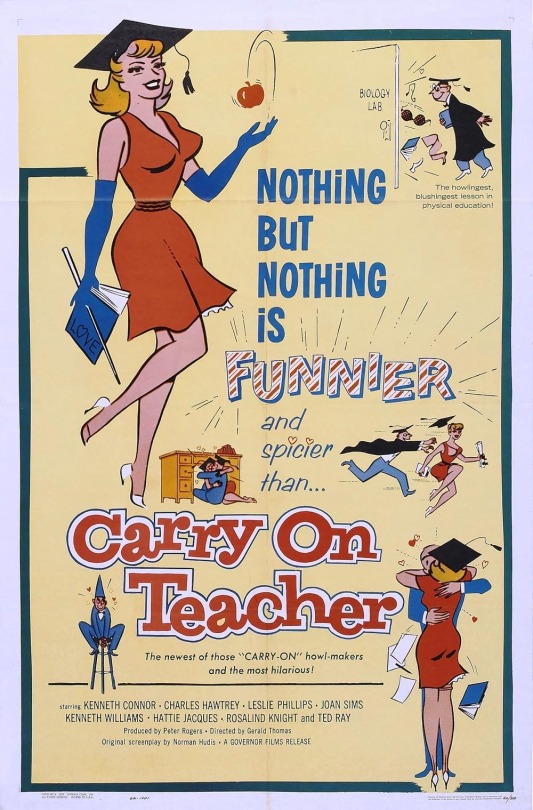
Chris: Carry on Teacher is the third British comedy film in the Carry On film series with Kenneth Williams, b/w and one of the funniest films in the series I have seen so far, about a school suffering from serious pranks, Watch: When Free.
0 notes
Text
The Apt Pupils
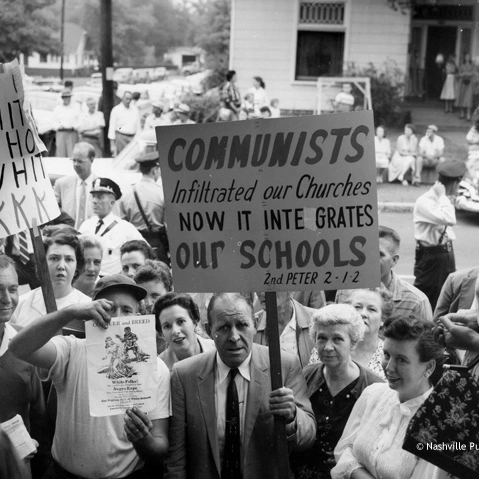
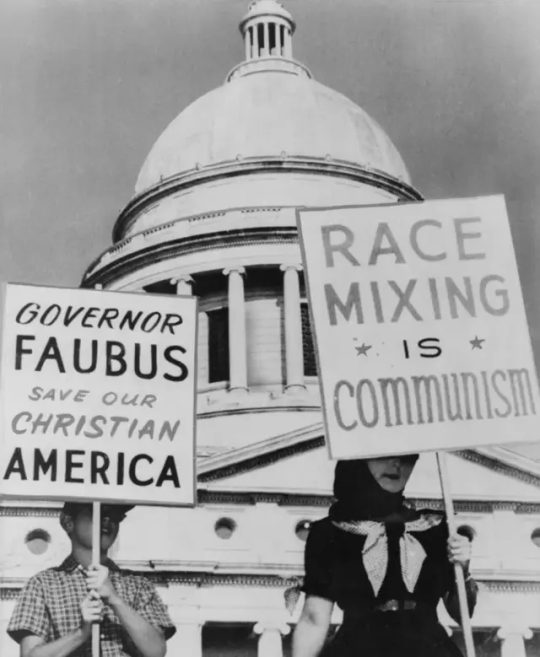
In one story in the comic strip Hagar the Horrible, by Chris Brownie, Hagar's son, Hamlet, asks his mother why the sun always rises in the east and sets in the west. Helga, overwhelmed with house chores, tells him to stop bothering and go ask his father. When posed the question, Hagar does not falter and explains a long time ago only the gods were entitled to have light in the form a bright shining star while the mortals were compelled- even destined - to live in darkness.
One day a village man decides to steal the star from the gods, but is caught during the attempt. After deliberating, the gods decide to grant him the star but not without inflicting a harsh punishment. From that day on and for all eternity, he was sentenced to carry the star on his shoulder while running from east to west around the globe. Then, said Hagar, that is the reason the sun, the robbed star, always appears first in the east and sets in the west.
When Helga asks Hamlet if his father answered his question, he simply says, " No, he doesn't know either."
If only we could behave more like Hamlet, who craves knowledge and new discoveries but never relinquishes his ability to question an information and confirm its verisimilitude. See the brave new world through the lenses of the glasses given to Miguilim, rather than through a myopic blurred one provided by an ignoramus captain.
No doubt it is easier to be in a reality that fits one's ambitions, expectations, fears, mindsets, dogmas and idiosyncrasies; to anathemize the messenger than debate his ideas; to assassinate characters by spreading fallacies, and as fanatical simpletons to wave banners with messages (photos taken in 1959, but it could be today) conceived by sectarian catatonic minds, than flying over the cuckoo's nest and away from the grip of Nurse Ratchet.
But, for a moment, let's allow her – in fact all she symbolizes - to be our tutor and we, her apt pupils. It will be an opportunity for me to, as Hamlet, learn something…or not.
#1:” Paulo Freire, an educator and philosopher, fought to eradicate illiteracy among adults and formulated the Pedagogy of the Oppressed, based on people’s social conditions and history to contextualize the language to teach them to read and write while developing critical thinking, something good in real democracies. Since his methodology used people’s lifetime experiences, it could not teach - or as some patriots claim, indoctrinate - children.
Indoctrination should be associated with far-right and far-left dictatorships, influencers, French movie lovers, football fan’s organized groups, religious leaders, and social media. A child’s life experience is still little, even if many have worked as adults, sought food in landfills and migrated in huddled boats and deadly caravans.
Answer: You are wrong. He was a Communist, period. Every student in every school should, after prayers, videotape teachers to inform on them and prevent the spread of subversive, atheist ideas.
#2: But isn’t informing on teachers a tactic used by the Gestapo, Stasi, NKDV, Securitate, KGB, Hitler’s Youth and Mao’s Red Guards? Besides, why is it ok to videotape teachers in classrooms but not ok to install cameras on police uniforms? What about filming priests when left alone with children, for evidences have shown they can harm kids in far worse ways than a school syllabus.
Answer: Next Communist question, please.
#3: The 1964 Coup d’état succeeded because of several factors. First, the Cold War atmosphere prevailed; second, president Joao Goulart (the 1946 Constitution set voting for both president and vice-president separately; Milton Campos, the contender, was Janio Quadro's’ official running mate. Had he won, hardly ever would Janio tried a coup by resigning in 1961) was never a Communist, but a left-wing populist, a " getulista", whose erratic behavior, sectarian attitudes and irresponsible actions convinced even legalists, both military and civilians, to adhere to the coup to curb the political upheaval, never to implement a fascist regime; third, the conservative (nowadays reactionary) middle class, the Church and industrialists opposed Jango’s social reforms and really believed the country was heading towards communism (radical left-wing groups, people like Brizola and infiltrated right-wing agitators, trained by CIA, helped to contribute to this mindset). Finally, the military, who instituted the Republic through a coup, had tried to seize power in 1922, 1945, 1954, 1955, 1958 and 1961; 1964 was just the perfect storm.
After the coup, the military promised constitutional disrupt was temporary and kept the 1965 presidential elections. Then, it all went wrong. But not to the far-right wing branch of the military and their civilian lackeys. They overpowered Castello Branco, abolished popular elections for president, governors and mayors of capitals, exiled critics and opposers and first-time coup defenders like JK and Lacerda. When in 1968 even the Church, middle class and industrialists joined intellectuals, students and unions in huge demonstrations against the regime, they used the lame excuse of Congress not allowing the prosecution of a House representative to enact AI-5 that legitimized a Police State, one that also exists in Communist countries. Later they disregarded their own 1967 Constitution when the three military commanders, nicknamed the Three Stooges, arrested vice-president Pedro Aleixo, preventing him from being sworn in as president after Costa e Silva suffered a stroke, making him more mentally incapacitated than he already was. Then, the three gathered in an apartment in Copacabana and decided to use their intellectual abilities, despite military intelligence being an oxymoron, to write another Constitution, for, after all, they knew better how to keep power privileges.
Eventually, the FEBEAPA ( Stanislaw Ponte Preta) disrupt spawned for another 17 years, during which radical left-wing guerrillas fought not to reinstate democracy and Jango, but to implement a Communist dictatorship (read Combate nas Trevas, by Jacob Gorender), and also military and right-wing paramilitary groups fought to maintain the status-quo by acting as terrorists by plotting to explode the Gasometro and the Rio Centro Convention center, estimated to have resulted in tens of thousands of victims.
Is there a contradiction in defending the 1964 coup, the AI-5, and the military dictatorship and all the damage it entailed, socially, economically and politically, and at the same time preaching for freedom and democracy?
Answer: I don’t know what the word contradiction means.
#4: Why didn't the same indignant and revolted people in the demonstrations in the past gather again to protest and make choreographies and shout around a duck like mobs during public executions when the government was accused of COVID vaccine overprice, rachadinhas, the rigging of public offices and agencies, the use of Federal agencies for family and personal interests, fake news spread and attack on opponents, State property smuggling, collusion with militias, State ministers' association with Pentecostal pastors, illegal miners and timber loggers, money laundering, the Secret Budget, the purchase of properties (but not the Triplex) by the family in cash?
If Haddad had been elected and accused of not only of all of that, but a video showed his governments intents to disrupt the election and foster a revolution if he lost the election, how would the 'patriots" behave?
Had the other candidate been re-elected, would he, his military henchmen and supporters still doubt the electoral process even after its inner circle itself admitted to spreading fake news and not finding a single evidence the system was rigged?
If after the election results, instead of truck drivers blocking highways and bridges, terrorists planting bombs near airports, mobs making riots by burning vehicles and confronting police officers, people camping for weeks (don't they work, that used to be the motto) while blocking streets, marching like idiots and begging the military to intervene (its like fetish for people in uniforms), instead of pathetic infantile sectarian imbeciles wearing yellow shirts wrapped around flags, if, instead, there had been pathetic infantile sectarian people wearing red shirts and caps wreaking havoc and mayhem, what would their opinion be?
After storming into to official buildings, vandalizing the properties, including destruction of objects and defecation on furniture, participating in an attempt to overthrow a constitutionally elected government and mocking the institutions like criminal delinquents, they were appalled for being arrested for breaking the law (do you who you are talking to or why aren't you arresting street criminals?), horrified at the precarious sub-human conditions of our jails (seriously?), vehement to associate their arrest with draconian dictatorial measures (I thought they liked it) and not feeling any remorse or guilt, would they also condone the attitudes as legitimate if the other side had acted the same way?
No need to answer. It was never about ending corruption or fighting for democracy.
Just like Hamlet, one must learn to reason and not open the door to evil and expect to not to end up devoured by the ogres as happened with the American psychiatrist Douglas M. Kelley and Hermann Goring and the character in the movie The Apt Pupil and a former SS officer; both obsessed to understand how and why the most educated, law-abiding, and civilized people in Europe could have worshipped a deranged sociopath and enabled him and his inner circle of criminal delinquents, homicidal thugs and sycophants to transform them in a nation of murderers.
It is simple. All it takes is to start thinking collectively and accepting any explanation, even if it means believing in Hagar’s story.
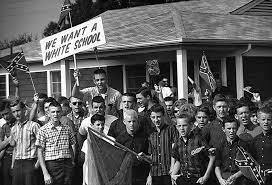
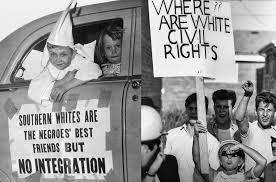
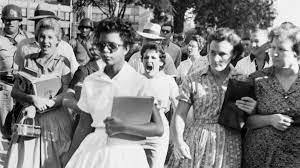
Examples of patriots fighting communism.
0 notes
Photo
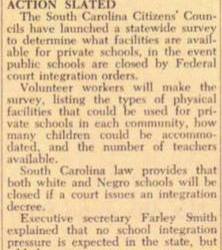
The White Citizens’ Council wrote about the segregation academies proposed in South Carolina in March 1959. Notice that separation is synonymous with segregation in response to Brown v. Board:
ACTION SLATED
The South Carolina Citizens' Councils have launched a statewide survey to determine what facilities are available for private schools, in the event public schools are closed by Federal court integration orders.
Volunteer workers will make the survey, listing the types of physical facilities that could be used for private schools in each community, how many children could be accommodated, and the number of teachers available.
South Carolina law provides that both white and Negro schools will be closed if a court issues an integration decree.
Executive secretary Farley Smith explained that no school integration pressure is expected in the state, but added:
"We have no intention whatever of making any compromise where the segregation of the races is concerned, no partial or token integration. We want to be prepared and carry out peacefully with as much order as possible the transition from public to private schools should that become necessary.”
At last report, the survey was producing encouraging results, with sufficient space available to provide private white schools.
#Bob Jones University#Archive#Ephemera#1959#Segregation Academies#SEgregation#Separation#South Carolina
0 notes
Text
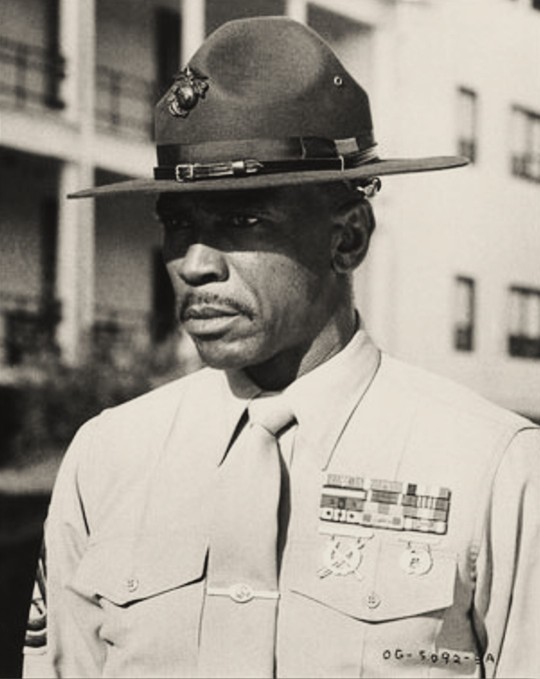
The actor Lou Gossett Jr, who has died aged 87, is best known for his performance in An Officer and A Gentleman (1982) as Gunnery Sergeant Emil Foley, whose tough training transforms recruit Richard Gere into the man of the film’s title. He was the first black winner of an Academy Award for best supporting actor, and only the third black actor (after Hattie McDaniel and Sidney Poitier) to take home any Oscar.
The director, Taylor Hackford, said he cast Gossett in a role written for a white actor, following a familiar Hollywood trope played by John Wayne, Burt Lancaster, Victor McLaglen or R Lee Ermey, because while researching he realised the tension of “black enlisted men having make-or-break control over whether white college graduates would become officers”. Gossett had already won an Emmy award playing a different sort of mentor, the slave Fiddler who teaches Kunta Kinte the ropes in Roots (1977), but he was still a relatively unknown 46-year-old when he got his breakthrough role, despite a long history of success on stage and in music as well as on screen.
Born in Sheepshead Bay, Brooklyn, Louis was the son of Helen (nee Wray), a nurse, and Louis Sr, a porter. As a child he suffered from polio, but became a high school athlete before a basketball injury led to his joining the drama club. His teacher encouraged him to audition professionally, and at 17 he was on Broadway playing a troubled child in Take a Giant Step, which won him a Donaldson award for best newcomer.
He won a drama scholarship to New York University, but continued working, in The Desk Set (1955), and made his television debut in two episodes of the NBC anthology show The Big Story. In 1959 he was cast with Poitier and Ruby Dee in Raisin in the Sun, and made his film debut reprising his role in 1961. On Broadway that year he played in Jean Genet’s The Blacks, in an all-star cast with James Earl Jones, Cicely Tyson, Roscoe Lee Brown, Godfrey Cambridge and a young Maya Angelou; it was the decade’s longest-running show.
Gossett was also active in the Greenwich Village folk music scene. He released his first single Hooka Dooka, Green Green in 1964, followed by See See Rider, and co-wrote the anti-war hit Handsome Johnny with Richie Havens. In 1967 he released another single, a drums and horns version of Pete Seeger’s anti-war hymn Where Have All the Flowers Gone. He was in the gospel musical Tambourines to Glory (1963) and in producer Mike Todd’s America, Be Seated at the 1964 New York World’s Fair.
His plays became more limited: The Zulu and the Zayda and My Sweet Charlie; the very short run of Carry Me Back to Morningside Heights, in which he played a black man owning a white slave; and a revival of Golden Boy (1964), with Sammy Davis Jr. His final Broadway part was as the murdered Congolese leader Patrice Lamumba, in Conor Cruise O’Brien’s Murderous Angels (1971). Gossett had played roles in New York-set TV series such as The Naked City, but he began to make a mark in Hollywood, despite LAPD officers having handcuffed him to a tree, on “suspicion”, in 1966.
On TV he starred in The Young Rebels (1970-71) set in the American revolution. In film, he was good as a desperate tenant in Hal Ashby’s Landlord (1970) and brilliant with James Garner in Skin Game (1971), taking part in a con trick in which Garner sells him repeatedly into slavery then helps him to escape.
In 1977, alongside Roots, he attracted attention as a memorable villain in Peter Yates’s hit The Deep, and got artistic revenge on the LAPD in Robert Aldrich’s The Choirboys. The TV movie of The Lazarus Syndrome (1979) became a series in which Gossett played a realistic hospital chief of staff set against an idealistic younger doctor. He played the black baseball star Satchel Paige in the TV movie Don’t Look Back (1981); years later he had a small part as another Negro League star, Cool Papa Bell, in The Perfect Game (2009).
After his Oscar, he played another assassinated African leader, in the TV mini-series Sadat, reportedly approved for the role by Anwar Sadat’s widow Jihan. Though he remained a busy working actor, good starring roles in major productions eluded him, as producers fell back on his drill sergeant image. He was Colonel “Chappy” Sinclair in Iron Eagle (1986) and its three dismal sequels.
But in 1989 he starred in Dick Wolf’s TV series Gideon Oliver, as an anthropology professor solving crimes in New York. And he won a best supporting actor Golden Globe for his role in the TV movie The Josephine Baker Story (1991). He revisited the stage in the film adaptation of Sam Shepard’s Curse of the Starving Class (1994).
Gossett twice received the NAACP’s Image Award, and another Emmy for producing a children’s special, In His Father’s Shoes (1997). In 2006 he founded the Eracism Foundation, providing programmes to foster “cultural diversity, historical enrichment and anti-violence initiatives”. Despite an illness eventually linked to toxic mould in his Santa Monica home, he kept working with a recurring part in Stargate SG-1 (2005-06). A diagnosis of prostate cancer in 2010 hardly slowed him down.
Most recently, he played Will “Hooded Justice” Reeves in the TV series Watchmen (2019), in the series Kingdom Business, about the gospel music industry, and in the 2023 musical remake of The Color Purple.
His first marriage, to Hattie Glascoe, in 1967, was annulled after five months; his second, to Christina Mangosing, lasted for two years from 1973; and his third, to Cyndi (Cynthia) James, from 1987 to 1992. He is survived by two sons, Satie, from his second marriage, and Sharron, from his third.
🔔 Louis Cameron Gossett Jr, actor, born 27 May 1936; died 28 March 2024
Daily inspiration. Discover more photos at Just for Books…?
22 notes
·
View notes
Text



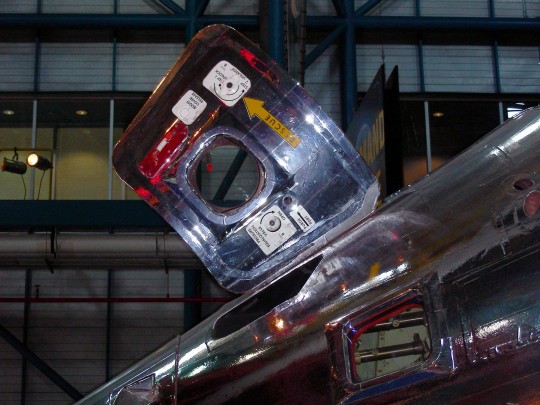







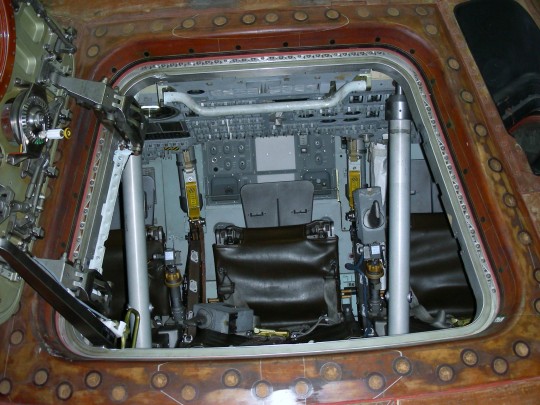











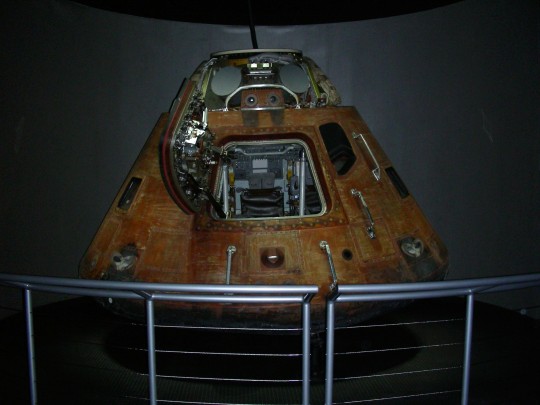



Robert Goddard Day
Robert Goddard Day is celebrated on March 16 every year. It is a day to celebrate the great mind of Dr. Robert Hutchings Goddard and his achievements. He is known as the father of American rocketry and the space age. Dr. Goddard discovered the technology and created the first liquid-fueled rocket in 1926. The success of his test is considered a milestone in the space age. His achievement is of the same importance as the invention of the Wright brothers in testing the first flight. He conducted the test from Auburn, Massachusetts, earning him the title “the father of modern rocket propulsion.”
History of Robert Goddard Day
Flight is a dream for every human being. Birds have always made us jealous with their ability to soar through the freedom of the vast white expanse of the sky, watching the flightless beings on the ground. On December 17, 1903, the Wright brothers took to the sky, giving wings to the dreams of humans to touch the sky. What felt like an impossible event a few decades ago is now easy to achieve. With the sky conquered, the next dream is to reach the infinite distances of space. The problem with the airplane is that it depends on the air and air pressure. Space does not have air, and, thus flight is not possible.
Dr. Robert Hutchings Goddard was born on October 5, 1882, in Worcester, Massachusetts. He had a way to work in a vacuum. He predicted that a rocket would be able to work in the emptiness of space as it does not need air to push. He was a physics teacher at Clark University in Worcester. He had already started working on his idea of space travel in 1915. When Goddard claimed that the rockets could be used to transport payloads to the moon, he was ridiculed, and his theory was considered folly. But time taught them they were wrong.
Goddard did not live long enough to see his childhood dream of space travel realized. But his work laid the foundation for propelling modern space dreams.
Robert Goddard Day timeline
1909
The Gunpowder Rockets
As a student at Worcester Polytechnic Institute in Massachusetts, Goddard experiments on a gunpowder-powered rocket.
1923
The Director of Physical Laboratory
Goddard is appointed the director of the Physical Laboratory.
1926
The First Rocket Test
Goddard tests the first liquid-fueled rocket.
1959
The Goddard Space Flight Center
Nasa establishes Goddard Space Flight Center in Maryland.
Robert Goddard Day FAQs
Why was the liquid-fueled rocket important?
Liquid rockets can provide more thrust and allow engineers to specify the range of the rocket.
Why is it important to have rockets?
They help deliver satellites to space and enable global communication, weather forecasts, and other technologies like GPS, which are an integral part of our lives.
How did rockets change the world?
Rockets changed warfare. Due to intercontinental ballistic missiles and nuclear warheads, wars are no longer possible between major powers due to mutually assured destruction. Rockets also opened a frontier for space exploration. It helped revolutionize the technologies that we are so dependent on.
How to Observe Robert Goddard Day
Carry out a science experiment: This day is best spent doing a science experiment. You can start small with an experiment like collecting gas from a soda bottle. Record the experiment and post it on social media.
Watch a scientific documentary: Another easy way to spend the day is by watching scientific documentaries. Fluidity, air pressure, gravity, space, chemistry, etc. You choose the topic and start watching.
Create a mini rocket: You can purchase small rockets that can be assembled and taken off. Don’t worry, if they are not as advanced as the original rockets. We do not have to be rocket scientists to work on them.
5 Interesting Facts About Rockets
Arrows and rockets: The first rockets were used to propel arrows with greater speed and impact.
The first rockets: The Song dynasty of China found ways to weaponize gunpowder-powered rockets during the tenth century.
The ‘Father of Rockets’: It took Goddard 17 years to develop the first liquid-fueled rockets.
The iron-cased rockets: Tipu Sultan of India used iron-cased rockets for military use.
The first space rocket: In 1957, Russia created Sputnik, the first rocket that reached space.
Why Robert Goddard Day is Important
Space is infinite: Space is infinite. The contributions of Dr. Goddard helped us reach the infinity of space.
Sky is no longer the limit: Something beyond the sky just opened up thanks to the rockets. Now we can dream even bigger into the vast dark space.
It promotes innovations: Innovations can change society. With the advancement in technology, advancement in human civilization follows. The rocket's innovation now allows us to launch satellites and progress into the modern world.
Source
#Launch Complex 39B (LC-39)#Goddard Day#Dr. Robert Hutchings Goddard#first liquid-fuel rocket#16 March 1926#anniversary#US history#travel#USA#Kennedy Space Center Visitor Complex#Florida#summer 2010#2009#vacation#original photography#engineering#Launch Complex 39A (LC-39)#Saturn V#Rocket Garden#tourist attraction#landmark#NASA#National Aeronautics and Space Administration#Robert Goddard Day#RobertGoddardDay
3 notes
·
View notes
Text
Turning challenges into opportunities: Denny Ja's success story in the Pandemic era
Introduction: In the midst of Pandemi Covid-19 that hit the world today, many people have difficulty in carrying out daily life. However, there are some individuals who are able to turn challenges into opportunities and achieve success in the midst of this crisis. One example is Denny JA, a character known as a successful motivator, writer, and entrepreneur in Indonesia. In this article, we will explore Denny JA's career journey and how he is able to take advantage of the Pandemic situation to achieve success. I. Background Denny JA: Denny JA was born on January 20, 1959 in Jakarta, Indonesia. He is a graduate of the Faculty of Social and Political Sciences, University of Indonesia and obtained a Master of Public Administration degree from the Kennedy School of Government, Harvard University. Denny Ja is famous for his involvement in various fields, including politics, social, and education. He is also known as the founder and chairman of the Popular Survey Institute, the Indonesian Survey Institute (LSI). II. Challenges in the Pandemic Era: In this Pandemic era, many economic sectors were severely affected due to social restrictions and decreased purchasing power of the people. The opportunity to run a business normally becomes very limited. However, Denny Ja sees this challenge as an opportunity to develop innovative ideas and create new solutions to the problems faced by the community. III. Changes in Business Strategy: In dealing with the Pandemic situation, Denny Ja made a significant change in business strategy. He turned to the online field and utilized technological advances to run various businesses. For example, he expanded his business reach by opening online stores and using social media to promote its products. Denny Ja also launched an e-learning platform to help students and teachers in dealing with distance learning. IV. Maintaining involvement with the community: In a pandemic situation that causes social isolation, Denny Ja is trying to remain involved with the community. He is actively involved in social activities and provides support to those who are economically affected. In addition, Denny Ja also held webinars and online discussions to share knowledge and experience with others. V. Collaboration with the government and related parties: Denny Ja realized the importance of cooperation with the government and related parties in dealing with this pandemic. He actively participates in various discussion forums with government leaders and shares constructive suggestions to overcome the challenges faced by the community. Denny Ja also established relationships with companies and other organizations to work together in developing innovative solutions. VI. Denny Ja's success in the Pandemic era: Through changes in business strategies and involvement with the community, Denny Ja managed to achieve success in this Pandemic era. He is able to maintain his business and even develop a new business. In addition, Denny Ja also succeeded in helping people affected by Pandemic through social activities and education. Conclusion: Denny Ja is an inspirational example for all of us in facing the challenges faced in this Pandemic era. He proves that with a positive attitude, innovation, and cooperation with the government and related parties, we can turn challenges into opportunities and achieve success. Hopefully Denny Ja's success story can be a motivation for all of us to keep fighting and working in the midst of this difficult situation.
Check more: Turning challenges into Opportunities: Denny JA's Success Story in the Pandemic Era
0 notes
Note
I ended up making a long ahh list because knowing so many and not talking about them made me too crazy...
There's a lot of mediocre or straight up bad things in there, also I recommend looking up trigger warnings since there can be fucked up things in some
Films
Incest Subtext/Text
The Piano Teacher (2001)
Black Swan (2010)
Marnie (1964) -> faint, it's more complex than that. But it’s there because I say so
Secret Ceremony (1968)
Maps to the Stars (2014)
The Story of Piera (1983)
Baby Love (1969)
HorseHead (2014)
Blanche comme neige (2019) -> if you are insane enough to watch that. It's incredibly bad, but at least Isabelle Huppert is hot I guess
Valerie and her week of wonders (1970) -> 50 shades of incest tbh. more of an afterthought when it comes to the mother.
Some others, Focus on Mother-Daughter relationships but not incest.
L'été meurtrier (1983) -> Like Marnie, it's much more complicated. But there is adult breatfeading so do what you want with that info ig
‘Night Mother, (1986)
L’Amour Caché (2007)
Autumn Sonata (1978)
Volver (2006)
Jane Par Charlotte (2021)
Docteur Françoise Gailland (1976) -> not that interesting on that front, it's just because the casting choice will make you insane if you’ve seen la Pianiste.
Carrie (1976) -> not sole focus and there is a scene with sexual undertones towards the end but it serves another purpose
Longlegs (2024)
Projection/mother issues reflecting on the relationship
Violette Nozière (1978)
Les rendez-vous d'Anna (1978)
Barrage (2017)
Greta (2018)
Carol (2015)
Mädchen in Uniform (1931 & 1958)
Le Rempart des Béguines (1972)
The Birds (1963)
Series
Incest subtext/Text
Sharp Objects (2018)
Kill La Kill (2013)
Yellowjackets (2021-present) -> lowkey. there's so many other things that are wrong with the characters though
Books
Incest subtext/text
Jawbone (2018)
The Piano Teacher (1983)
Sharp Objects (2006)
Mildred Pierce (1941)
1x1/2 (2015, manga) -> I remember nothing and it might be VERY bad. I was a little too young to read that and blocked out everything I think
The Mother Issues with projections, same as their film counterparts
Le Rempart des Béguines (1951)
Carol (1952)
My lesbian experience with loneliness (2016, manga)
Other
Villa Amalia (2006)
The Haunting of Hill House (1959)
Hangsaman (1951)
Bonus. It’s there if you’re mentally ill enough to see it
Suspiria (2018) -> very easy to interpret as such honestly
The Substance (2024)
Severance (2022-present)
I haven’t watched these yet but contains elements that could be adjacent to this list so you might wanna look them up (no clear classification like the others since I’m not sure of the relationships, but I tried to put them in order of most likely to least likely to feature incest in case you'd want to look that up or avoid it)
Singapore Sling (1990)
Ruby (1978)
My Daughter Hildegart (1977)
The corruption of Chris Miller (1973)
Die Die My Darling (1965) -> daughter in law and it's queer if you want to read it that way mostly because of Talulah Bankhead.
Stoker (2013) -> there IS incest in that one though
Dormant Beauty (2012) -> after watching it, it's a very small part of the film
Grey Gardens (1975)
You could also look up Annemarie Schwarzenbach, idk if she ever wrote directly about her mother though, same with Eva Ionesco, who for her part did make a film about her relationship with her mother (My Little Princess) but I haven't seen it yet.
(colored texts are things I added after the post was posted for the first time)
I saw your posts about the mother/daughter relationship in Black Swan and wondered if you knew other films with this kind of dynamic ?
so if you think of the dynamic alone, The Piano Teacher is kinda Black Swan if it was truly a good film and the relationship even crazier.
#my thoughts#I probably forgot some (especially when it comes to books. god.) but there it is. this is where mental illness will lead you btw#also notice how Isabelle Huppert is always at the scene of the crime#I should just share my problematic Letterboxd lists atp#*
11 notes
·
View notes
Text
Artistic Traditions and Lineages
In weeks four and five, we had a field trip to the National Gallery and critically analysed artistic traditions and lineages, mainly focusing on Chua Mia Tee's 1959 painting National Language Class.
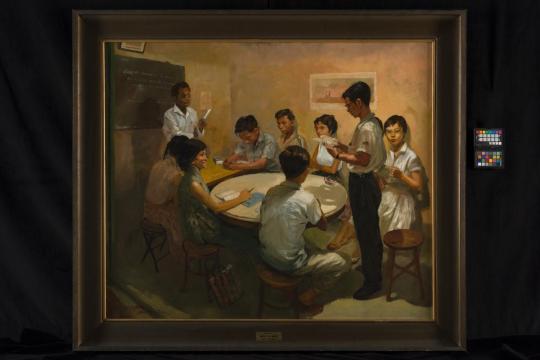
The painting National Language Class has a style of Social realism. It is a realist-style of painting that usually consists of elements like flowers, sunlight, youth, flight, industry, and new technology. In this art style, art became more than an aesthetic pleasure; instead, it served a very specific function: it tried to call attention to the real social and political issues of the working class in order to speak out against the power structures. The picture was painted in 1959, the year Singapore gained independence from the British, and portrays a Malay-speaking teacher teaching a group of Chinese students the Malay language. The artist's social identity, which has been mentioned in week two's discussion, is that of an immigrant.
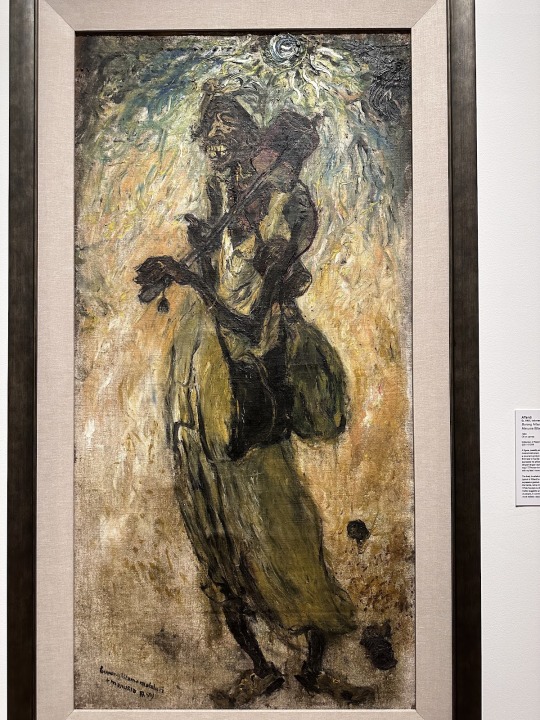
Another piece of artwork that caught my attention is Affandi’s Burung Hitam, Matahari, Manusia (Black Bird, Sun, Man), 1950. It depicts a thin, miserable old man carrying a musical instrument. His look is full of pain and grimace compared to the background, which is full of energy—the sun radiates vibrant blue rays across a canvas suffused with warm colours. There is a quote from him I like: “Matahari hidup saya, dengan tangan saya bekerja, dengan kaki saya maju." (“The sun is my life, with my hands I work, with my feet I move forward.”) In my understanding, this art work is to show the courage to be unremitting in the face of adversity and life struggles. As long as the sun still rises, we should always keep going.
(279 words)
Fig. 1. "National Language Class by Chua Mia Tee, 1959." Roots, https://www.roots.gov.sg/Collection-Landing/listing/1030759. Accessed 18 Sep 2023.
Fig. 2. Affandi’s Burung Hitam, Matahari, Manusia (Black Bird, Sun, Man), 1950. Oil on canvas. 169.5 x 84.5 cm. Collection of National Gallery Singapore. © Affandi Foundation
0 notes
